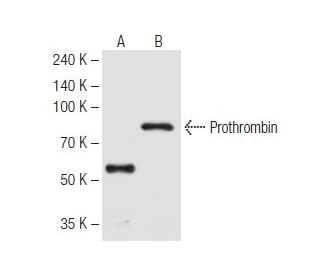


Anticorps Prothrombin (28H5): sc-69769
- L'anticorps Prothrombin 28H5 est un monoclonal IgG2b de souris fourni en 100 µg/ml
- dirigé contre Prothrombin d'origine human
- recommandé pour la détection de Prothrombin d'origine human par WB, IP et ELISA
- Voir Thrombin (F-1): sc-271449 pour d'autres anticorps conjugués Prothrombin, dont AC, HRP, FITC, PE, Alexa Fluor® 488, 594, 647, 680 et 790.
- Nous testons actuellement encore nos anticorps secondaires pour trouver la meilleure protéine de liaison pour cet anticorps primaire Prothrombin (28H5). Veuillez nous contacter si vous avez des questions concernant les réactifs de détection secondaire appropriés.
ACCÈS RAPIDE AUX LIENS
Hemostasis following tissue injury involves the deployment of essential plasma procoagulants (Prothrombin and Factors X, IX, V and VIII), which mediate a blood coagulation cascade that leads to the formation of insoluble Fibrin clots and the promotion of platelet aggregation. Proteolytic cleavage of Prothrombin (Factor II) at residue 44 leads to formation of Thrombin in the first step of the coagulation cascade. Thrombin cleaves bonds between Arg and Gly and activates Factors V, VII, VIII and XIII in complex with thrombomodulin and Protein C. Thrombin maintains vascular integrity during development and postnatal life and coordinates connective tissue proteins by stimulating fibroblast procollagen production.
Alexa Fluor® est une marque déposée de Molecular Probes Inc., OR., USA
LI-COR® et Odyssey® sont marques déposées de LI-COR Biosciences
Anticorps Prothrombin (28H5) Références:
- Thrombogénicité des concentrés de complexe prothrombique. | Köhler, M. 1999. Thromb Res. 95: S13-7. PMID: 10499904
- Déficit congénital en prothrombine. | Lancellotti, S. and De Cristofaro, R. 2009. Semin Thromb Hemost. 35: 367-81. PMID: 19598065
- Déficit héréditaire en prothrombine. | Ejaz, MS., et al. 2009. J Pak Med Assoc. 59: 637-9. PMID: 19750864
- Fragments de prothrombine dans les maladies cardiovasculaires. | Páramo, JA. 2010. Adv Clin Chem. 51: 1-23. PMID: 20857616
- Concentré de complexe prothrombique. | Cada, DJ., et al. 2013. Hosp Pharm. 48: 951-7. PMID: 24474837
- Sonder la structure de la prothrombine par protéolyse limitée. | Acquasaliente, L., et al. 2019. Sci Rep. 9: 6125. PMID: 30992526
- Utilisation de plasma et de concentrés de complexe prothrombique. | Levy, JH., et al. 2020. Semin Thromb Hemost. 46: 32-37. PMID: 31537028
- Vitamine K et synthèse de la prothrombine. | Suttie, JW. 1973. Nutr Rev. 31: 105-9. PMID: 4578889
- La biologie de la prothrombine. | Degen, SJ. and Sun, WY. 1998. Crit Rev Eukaryot Gene Expr. 8: 203-24. PMID: 9714898
- La prothrombine comme cofacteur des antiphospholipides. | Galli, M. and Barbui, T. 1998. Lupus. 7 Suppl 2: S37-40. PMID: 9814670
Informations pour la commande
| Nom du produit | Ref. Catalogue | COND. | Prix HT | QTÉ | Favoris | |
Anticorps Prothrombin (28H5) | sc-69769 | 100 µg/ml | RMB2422.00 |

